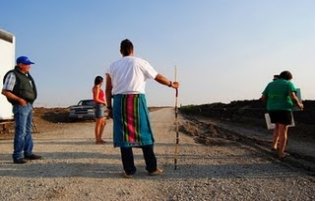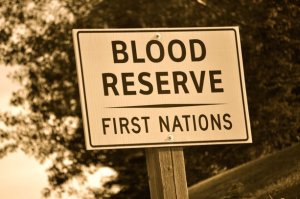Cross-posted from CENSORED NEWS-Brenda Norrell
Category Archives: Energy
Elle-Maija Tailfeathers, Blood Nation: Statement on arrest at fracturing blockade
Comments Off on Elle-Maija Tailfeathers, Blood Nation: Statement on arrest at fracturing blockade
Filed under Actions / Protest, Climate Change, Energy, Hydrofracking, Indigenous Peoples
All Strong-Hearted People Invited To Come and Stand With US! DEFEND Mother Earth!
Source: Indigenous Environmental Network
UPDATE: Sept. 10, 2011 – Blood Tribe Women Arrested!
Blood Reserve, First Nations’ Women Arrested, Charged with Trespass on their own Land, Jailed Over Night, Released With Threats of MORE FINES and Charges
Two videos at the end of this posting
WOMEN members of the Blood Tribe; Elle-Máijá Tailfeathers, Lois Frank, and Jill Crop Earred Wolf were arrested September 9, 2011 and charged with trespass in their own community on Blood Tribe land by tribal law enforcement and RCMP. Although they could have been booked and released from the tribal jail Friday evening, the chief, instead, held them all night and released them the morning of September 10, 2011 with the threat, that if they continued their blockade and protest each person would be arrested, charged and fined $1,500!
NOTE: In late 2010, Kainaiwa Resources Inc. (KRI) quietly signed off on a deal with the Calgary-based junior mining company Bowood Energy and the U.S. company Murphy Oil. In exchange for the $50 Million, Bowood Energy and Murphy Oil gained a five-year lease to roughly 129, 280 acres, almost half of the Blood’s reserve, for oil and gas exploration.
More actions are planned – and calling on more people to join them!
**If you are interested in helping to support this action**
Please Contact For More Information:
Lois Frank 403-795-7945
Mike Bruisedhead 403-737-2194
UPDATE: September 9, 2011
Sept. 9, 2011: From Maiji Tailfeathers: “Just got arrested. In the back of the cop car with Lois Frank. Texting with handcuffs. 3 Blood Tribe women.” Photos by Arnell Tailfeathers
 Early [September 9, 2011] numerous women from the Blood Nation have courageously parked in front of Murphy Oil’s fracking development site vowing not to move until plans of fracking for oil and gas are stopped. The women are part of the Kainai Earth Watch and have been active advocates to stop the fracking due to the major threat to human health, wildlife and livestock and the irreversible damage to the land and water on the Blood Reserve and surrounding areas. They feel this is the only choice left to them to stop the operations as plans for construction begin tomorrow [September 10, 2011].
Early [September 9, 2011] numerous women from the Blood Nation have courageously parked in front of Murphy Oil’s fracking development site vowing not to move until plans of fracking for oil and gas are stopped. The women are part of the Kainai Earth Watch and have been active advocates to stop the fracking due to the major threat to human health, wildlife and livestock and the irreversible damage to the land and water on the Blood Reserve and surrounding areas. They feel this is the only choice left to them to stop the operations as plans for construction begin tomorrow [September 10, 2011].
In late 2010, Kainaiwa Resources Inc. (KRI) quietly signed off on a deal with the Calgary-based junior mining company Bowood Energy and the U.S. company Murphy Oil. In exchange for the $50 Million, Bowood Energy and Murphy Oil gained a five-year lease to roughly 129, 280 acres, almost half of the Blood’s reserve, for oil and gas exploration.
 Since that time local residents of the Blood Nation and surrounding communities have come together to oppose the projects. Members of the KaiNai Earth Watch have partnered with numerous community groups, including the Lethbridge Council of Canadians, to host numerous educational workshops, organize petitions, and meet with government officials. Despite their efforts, nothing has been effective in actually preventing the fracking from going ahead.
Since that time local residents of the Blood Nation and surrounding communities have come together to oppose the projects. Members of the KaiNai Earth Watch have partnered with numerous community groups, including the Lethbridge Council of Canadians, to host numerous educational workshops, organize petitions, and meet with government officials. Despite their efforts, nothing has been effective in actually preventing the fracking from going ahead.
Plans of construction on four new fracking sites begin tomorrow. The women have vowed not to leave until they are confident the fracking won’t go ahead.
The first issue is the toxic nature of the drilling and its capacity to do irreversible damage to the land and water on the Blood Reserve and surrounding areas. Furthermore, fracking poses a major threat to human health, wildlife and livestock.
 The second issue at hand is the nature of the deal between KRI, Murphy Oil, and Bowood Energy. We believe this to be highly problematic for a number of reasons:
The second issue at hand is the nature of the deal between KRI, Murphy Oil, and Bowood Energy. We believe this to be highly problematic for a number of reasons:
- Blood Tribe members were NOT consulted during the negotiations of this deal even though the drilling will occur on Blood Tribe land.
- KRI and the Blood Tribe Chief and Council neglected to maintain any degree of transparency during and after the negotiations. Ultimately, leaving a large population of tribe members completely unaware of the situation until after the deal was made.
- Above all else, the health and well-being of Blood Tribe members and all future generations will be compromised due to the rash and reckless decision by KRI and Blood Tribe Chief and Council to sign this deal with Murphy Oil and Bowood Energy
For more information on hydraulic fracturing here:
READ: Murphy Oil’s environmental history spotty
READ: Huffington Post – Fracking News, Videos, Information
WATCH: Is Your Water at Risk from Fracking?
READ: Hydraulic Fracturing 101
READ: Why should fracking be banned?
An Arrest:
Comments Off on All Strong-Hearted People Invited To Come and Stand With US! DEFEND Mother Earth!
Filed under Actions / Protest, Climate Change, Energy, Hydrofracking, Indigenous Peoples
KPFK Interview: The Indigenous Day of Action Against the Tar Sands in DC

Clayton Thomas Muller leads a workshop on the tar sands at the US Social Forum in Detroit in June 2010. Photo: Langelle/GJEP
This week’s Earth Segment on KPFK Los Angeles features an interview with Clayton Thomas Muller, Tar Sands Campaign Organizer for the Indigenous Environmental Network and a member of Global Justice Ecology Project’s Board of Directors.
Clayton discusses the Indigenous Day of Action that took place in Washington, DC on September 2nd to stop the Tar Sands Keystone XL pipeline, as well as the impacts of the pipeline and the tar sands gigaproject on Indigenous communities.
To listen to this interview click here and scroll to minute 6:12.
About Clayton:
Clayton Thomas-Muller, of the Mathias Colomb Cree Nation also known as Pukatawagan in Northern Manitoba, Canada, is an activist for Indigenous rights and environmental justice. With his roots in the inner city of Winnipeg, Manitoba, Canada,Clayton began his work as a community organizer, working with Aboriginal youth. Over the years Clayton work has taken him to five continents across our Mother Earth.
Based out of Ottawa, Ontario, Canada, Clayton is involved in many initiatives to support the building of an inclusive movement for Energy and Climate Justice. He serves on the board of the Global Justice Ecology Project and Canadian based Raven Trust.
Recognized by Utne Magazine as one of the top 30 under 30 activists in the United States and as a Climate Hero 2009 by Yes Magazine, Clayton is the tar sands campaign organizer for the Indigenous Environmental Network. He works across Canada, Alaska and the lower 48 states with grassroots indigenous communities to defend against the sprawling infrastructure that includes pipelines, refineries and extraction associated with the tar sands, the largest and most destructive industrial development in the history of mankind.
The Earth Segment is a collaborative effort between Global Justice Ecology Project and KPFK’s Sojourner Truth show with Margaret Prescod.
Comments Off on KPFK Interview: The Indigenous Day of Action Against the Tar Sands in DC
Filed under Actions / Protest, Biodiversity, Climate Change, Climate Justice, Energy, Indigenous Peoples, Tar Sands
Indigenous Peoples Arrested In Front Of White House To Protest Keystone XL Pipeline (short video)
Washington DC- American Indian and Canadian Native leaders were arrested September 2, 2011, in front of the White House as they refused to move under orders from the police. Representatives of Native governments and Native organizations from the United States and Canada traveled long distances to join thousands of people that have come to Washington DC during the past two weeks to tell US President Barack Obama not to issue a permit for the construction of a controversial 1,900 mile oil pipeline from Canada to the Gulf Coast.
The Indigenous Call: Take Back Our Future
More on yesterday: First Nations and American Indian Leaders Arrested In Front Of White House To Protest Keystone XL Pipeline
Comments Off on Indigenous Peoples Arrested In Front Of White House To Protest Keystone XL Pipeline (short video)
Filed under Actions / Protest, Climate Change, Energy, Indigenous Peoples, UNFCCC
KPFK Earth Segment: The Tar Sands Indigenous Day of Action with Chief Erasmus
 Global Justice Ecology Project teams up with Margaret Prescod’s Sojourner Truth show on KPFK Los Angeles for a weekly segment on an environmental topic.
Global Justice Ecology Project teams up with Margaret Prescod’s Sojourner Truth show on KPFK Los Angeles for a weekly segment on an environmental topic.
This week’s show features an interview with Chief Bill Erasmus, the Regional Chief of the Northwest Territories. He is from the Dene Nation. Regional Chief Erasmus has been elected as a member of the AFN Executive Committee since 1987. Chief Erasmus was instrumental in working with the National Congress of American Indians as the NWT Vice Chief of the Assembly of First Nations in their passage of the resolution opposing the Keystone XL Tar Sands Pipeline. He will be taking part in the DC Indigenous day of action on Sept 2, 2011
To listen to the 12 minute interview, click here and scroll to minute 21:40.
Comments Off on KPFK Earth Segment: The Tar Sands Indigenous Day of Action with Chief Erasmus
Filed under Actions / Protest, Biodiversity, Climate Change, Climate Justice, Energy, Indigenous Peoples, Pollution, Tar Sands, Water
Earth Minute 8/30/11: Climate Change, the Tar Sands and Hurricane Irene
 Global Justice Ecology Project teams up with the Sojourner Truth show on KPFK Los Angeles every Tuesday for an Earth Minute written and recorded by GJEP Executive Director Anne Petermann.
Global Justice Ecology Project teams up with the Sojourner Truth show on KPFK Los Angeles every Tuesday for an Earth Minute written and recorded by GJEP Executive Director Anne Petermann.
To listen to this week’s Earth Minute, click here and scroll to minute 38:41
Earth Minute 8/30/11
As I sat home yesterday listening to the remnants of Hurricane Irene whipping the trees outside, I thought about the intensifying effect the warming globe is having on the world’s weather; and about the corporations that ignore or deny it, continuing business as usual to the detriment of us all.
The tar sands gigaproject in Northern Alberta is one glaring example. The Indigenous Environmental Network has campaigned to stop the tar sands project for years. Tar sands oil production poisons Indigenous communities, levels boreal forests, and releases three times the greenhouse gases of conventional oil. But rather than banning this devastating project, a new pipeline is planned, to carry this toxic oil through the US to the Gulf of Mexico.
Hurricane Irene caused billions in damages. Burning tar sands oil will further worsen climate change, causing more extreme weather in the future.
The Indigenous Environmental Network will be holding an Indigenous Day of Action against the tar sands this Friday at the gates of the White House. To learn more, go to: www.ienearth.org/
For the Earth Minute and the Sojourner Truth show, this is Anne Petermann from Global Justice Ecology Project.
Comments Off on Earth Minute 8/30/11: Climate Change, the Tar Sands and Hurricane Irene
Filed under Actions / Protest, Climate Change, Climate Justice, Earth Minute, Energy, Posts from Anne Petermann
Climate Challenge Media With GJEP’s Anne Petermann on GE Trees
A half hour interview on the dangers of genetically engineered trees and their relation to climate mitigation schemes. With Climate Challenge host, Karen Strickler:
(click on the link above–we were not able to embed the video in this blog post)
Comments Off on Climate Challenge Media With GJEP’s Anne Petermann on GE Trees
Filed under Biodiversity, Climate Change, Corporate Globalization, Energy, False Solutions to Climate Change, Food Sovereignty, GE Trees, Genetic Engineering, Posts from Anne Petermann, REDD, UNFCCC
Environmental, Indigenous Peoples and Human Rights Groups Reject International Offsets in California’s Global Warming Solutions Act
Oakland, CA – The California Air Resources Board meets tomorrow in Sacramento, CA to announce the findings of its evaluation of alternatives to Cap and Trade in AB32, the state’s Global Warming Solutions Act. Environmental, indigenous peoples’ and human rights groups warn that outsourcing the state’s emissions reductions through carbon offsets will shift the responsibility for the climate crisis from industry to under-resourced communities, both in California and abroad.
“Any Cap and Trade Provision in AB32 will not only leave California communities continuing to bear the brunt of industrial pollution, they are no solution to climate change,” said Jeff Conant from the Oakland, CA office of Global Justice Ecology Project. “If the offsets are enacted in-state it will undermine forest conservation in California. If California’s offsets are enacted at the international level, they will exacerbate land and resource conflicts in places like Chiapas, Mexico and Acre, Brazil – especially because these offsets are based on the controversial policy of Reducing Emissions from Deforestation and Degradation (REDD).”
The Cap and Trade provision in AB32 has clear links to REDD-type forest carbon offsets, as demonstrated by the Memoranda of Understanding signed by former Governor Schwarzenegger last year with the state governments of Chiapas and Acre. While the mechanism for such an offsets program is not expected to be enacted until 2015, the effects of the policy are already showing impacts in these states. Commentators see this MoU as the world’s most advanced sub-national carbon offsets agreement, which could serve as a model for similar agreements worldwide.

Traditional healers prepare medicines in Amador Hernandez after the Mexican government cut off all medical services. The local residents believe this was done in an attempt to force them out of the Lacandon Jungle. Photo: Langelle/GJEP-GFC
In comments submitted to the California Air Resources Board, Francisco Hernández Maldonado, an indigenous Tzeltal from the village of Amador Hernández in the Lacandon Jungle of Chiapas, Mexico wrote: “The promotion of REDD+ in Chiapas, which the government is doing without consulting us, is causing conflict between our peoples, because it benefits some and tries to criminalize those who truly dedicate ourselves to coexist with the earth and are not in favor of REDD + as a solution to climate change. By failing to consult us, our human rights are violated as well as international agreements such as the United Nations Declaration on the Rights of Indigenous Peoples.”
The Air Resources Board says that REDD as part of a Cap and Trade program will be developed under a separate process with public participation and environmental review. But critics of REDD recognize that the mere suggestion that California will engage in international offsets sends “price signals” to developing world governments – signals that have already led to forced evictions in the name of forest protection.
“These REDD forest offset initiatives in Mexico and the global South have no guarantees for safeguarding against land grabs and violating the rights of indigenous communities,” said Tom Goldtooth, Director of the Indigenous Environmental Network. “Putting trust in carbon market regimes based upon the privatization and commodification of air, trees and biodiversity could be devastating to indigenous peoples and their cultures. Not only abroad, but right here at home. Many of the dirtiest industries in the U.S. and Canada are located on Indigenous and First Nations lands that would benefit from domestic and international offsets, buying carbon credits to greenwash the pollution and toxic hotspots they create in local communities. Our people lose out on all sides of the border. There is no justice in carbon offsets – only more suffering.”
A coalition of California environmental justice groups is expected to turn out in Sacramento to demand that the Air Resources Board give real attention to concerns of ongoing pollution in the state’s heavily impacted industrial zones.
“Cap and Trade is no solution to climate change,” said Nile Malloy of Communities for a Better Environment in Oakland, CA. “It allows industry to continue polluting our communities, while the emissions continue to worsen climate change. It is a lose-lose scenario, benefiting only corporations like Chevron.”
For more information, contact:
Jeff Conant, Global Justice Ecology Project, Oakland, CA, +1.575.770.2829
Orin Langelle, Global Justice Ecology Project, Hinesburg, VT, +1.802.578.6980
Diana Pei Wu, Professor, Antioch University, Los Angeles, CA, +1.323.448.0566
Tom Goldtooth, Indigenous Environmental Network Bemidji, MN, +1.218.760.0442
Low resolution photographs from the Chiapas jungle: http://www.flickr.com/photos/langelle/sets/72157627501175098/
Higher resolutions of those photographs from the Chiapas jungle are available to media by contacting Orin Langelle +1.802.578.6980 mobile or by email <orinl@globaljusticeecology.org>.
###
Background Information:
Key Arguments Against REDD fact sheet
Turning the Lacandon Jungle Over to the Carbon Market
Interview with Santiago Martinez of Amador Hernandez, Chiapas
Photo Essay from Amador Hernandez, Chiapas, Mexico: Chiapas, Mexico: From Living in the jungle to ‘existing’ in “little houses made of ticky-tacky…”
Comments Off on Environmental, Indigenous Peoples and Human Rights Groups Reject International Offsets in California’s Global Warming Solutions Act
Filed under Carbon Trading, Chiapas, Climate Change, Corporate Globalization, Energy, False Solutions to Climate Change, Greenwashing, Indigenous Peoples, Land Grabs, Latin America-Caribbean, Pollution, REDD



